How to Get Rid of Mucus and Post Nasal Drip
Post-nasal drip is a condition under which excess mucus keeps on dripping at the back of the throat and blocks the airways. It is commonly known as upper airway cough syndrome, and can be quite distressing.
Although we all have a layer of mucus at the back of our throats under normal conditions, post-nasal drip causes the layer of mucus to become abnormally thick, impeding day-to-day activity.
The mucus may even become yellow or green and could potentially produce odor under extreme circumstances.
Did you know?
Your body (throat and nose) produces around two quarts of mucus naturally every single day.
From a symptom standpoint, post-nasal drip results in bouts of coughing and congestion of the chest, among other medical abnormalities.
This article covers everything that you can encounter while suffering from this condition as well as the remedies and treatments to cure it.
All you need to do is to follow these guidelines and let your body be your fighter.
How Does Post Nasal Drip Occur?
Your body continuously produces chemicals, fluids, and secretions which are essential for many internal processes.
Just like gastric juices, which maintain the pH of your stomach, your sinuses, throat, and nose secrete mucus.
Mucus helps us with normal breathing by keeping the nasal passages and airways moist and clean throughout the day.The basic function of mucus is to trap the foreign particles and stop them from entering your cavities.
With growing populations and global warming, our atmosphere is becoming polluted and full of germs. Environmental pollutants such as dirt, dust mites, and pollen enter our nostrils as we breathe and keep accumulating inside the airways by sticking to the mucus.
The mucus mixes with saliva and after that, there are two ways for it to leave your body; you either swallow it or expel it.
However, when you are exposed to too much dust, dirt, or pollen, your body starts producing more mucus to prevent these particles from entering the nasal cavities. Thus, the condition of post-nasal drip may occur.
If you're suffering from post-nasal drip, you might feel mucus continuously dripping down the back of your throat and nose.
Causes of Post Nasal Drip
There are several reasons due to which excess mucus runs down and accumulates at the back of your throat.
Keep in mind that there are two categories of post-nasal drip; one is allergic and the other is a non-allergic post-nasal drip.
Allergies
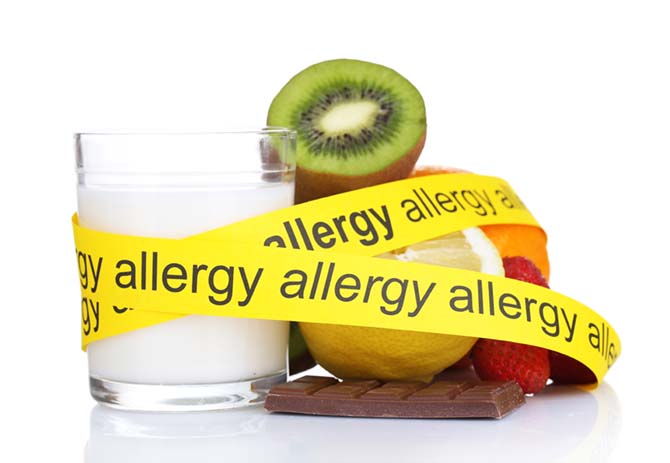
This condition is generally triggered due to environmental factors as well as certain changes in your body. One of the most common triggers of post-nasal drip are seasonal or pet allergies.
Seasonal allergies relate to a natural sensitivity to pollen, which disturbs the normal functioning of the sinus.
Consequently, you experience complications in breathing and mucus starts dripping down the back of your nose and eventually reaches your throat.
Same is the case with pet allergies, where pet fur or hair disturbs and triggers your sinus and as a defense mechanism, and your body starts producing more mucus.
Cold and Dry Weather
Cold and dry weather often causes post-nasal drip. Staying in the cold for too long or breathing in dry air is the ultimate enabler of post-nasal drip.
Staying in such extreme environments for far too long can trigger sinus infections, colds, and flu. These viral infections lead to post-nasal drip, as your body tries to avoid these germs by producing more mucus.
Prognosis for post-nasal drip caused due to allergies and that caused by illness is similar.
Other Causes
Other than allergies and cold, the following are some other causes of post-nasal drip;
- Hormonal factors like pregnancy and hypothyroidism,
- Overuse of saline sprays, especially Afrin,
- Sinusitis,
- Hay Fever,
- Smoking and overuse of alcohol among other drugs,
- Consuming spicy foods,
- Consuming dairy products in any form,
- Sticking of foreign objects inside the nose,
- Strenuous workouts.
Symptoms of Post-nasal drip
With the buildup of too much mucus, the condition of post-nasal drips develops. If you're experiencing some of the following signs and symptoms, then you might have post nasal drip;
- Sticky liquid dripping at the back of your nose and going into the throat,
- Coughing that becomes unbearable, especially at night,
- An itchy and tickling sensation inside your nose and at the back of your throat,
- A hoarse voice,
- Severe nose bleeding (post-nasal drip can make your nasal cavity dry and irritable),
- An obstruction in one or both the nostrils due to the swelling of the nasal passages
- Facial pain (occurs due to deviated septum which can only be operated through surgery).
Home Remedies for Post Nasal Drip
Although, there is nothing supernatural about home remedies, there is no harm in trying them out before jumping onto strong medication.
Fruits, vegetables, herbs, and essential oils are the perfect sources of remedies in many cases; the case is no different for post-nasal drip. Moreover, natural remedies are inexpensive and highly accessible, so there's that to consider.
Here is how you can tackle post-nasal drip at home.
Invest In A Humidifier
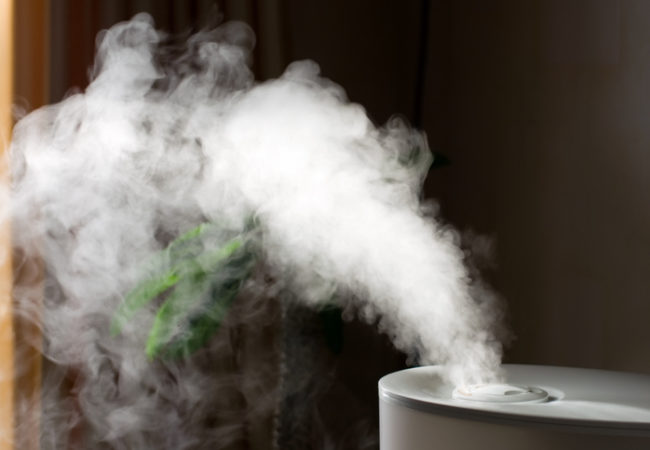
Humidifier spreading steam into the living room
Humidifiers are used in many cold and dry regions for the common cold and the flu.
Humidifiers can also be great sources of relief when you experience post-nasal drip. A cool-mist humidifier raises the moisture level of the surroundings and reduces dryness, which is one of the main causes of post-nasal drip.
Because humidifiers improve ambient conditions and negate those that stimulate mucus buildup, they are good alternatives used to combat post-nasal drip.
Use Vicks VapoRub
If you don't have anything, you have Vicks VapoRub. Vicks VapoRub is rich in menthol, which is excellent for soothing your throat and for opening up the nasal passageways.
Menthol is also the main ingredient in cough drops, as it has the properties of relieving congestion. Therefore, VapoRub encourages easier breathing and relieves certain post-nasal drip symptoms as well.
Another advantage of Vicks VapoRub is that it doesn't have any side effects. Children and adults can both benefit from its application without fear.
This is perhaps why it is considered one of the best ways to combat mucus build up, especially in case you don't have anything else within reach.
Use A Saline Nasal Solution or Mist
Many studies reveal that using a saline mist or solution can help prevent the signs and symptoms of post-nasal drip.
Generally, dry air affects the nasal passages, making them dry and congested. Additionally, dry air also dries out the sinuses and consequently causes inflammation and blockage of the mucous membrane.
By using a saline solution, you can treat dryness and congestion effectively. Regularly spraying this solution in the form of mist inside your nostrils will liquefy hardened mucus and will help thin it down. By cleansing the nasal passage, you're on your way to eliminating post-nasal drip!
Watch this video to learn more about how to use the saline solution correctly
Also, learn about nasal health and how can you keep your respiratory system healthy;
Aromatherapy With Essential Oils
Essentials oils are excellent for various sorts of therapies for ailments that include anxiety, depression, and sleep disorders. However, most people are unaware of the fact that essential oils are also effective for flu and sinus health.
Essential oils such as Bergamot oil, red thyme oil, geranium oil, rosemary oil, eucalyptus oil, and many other essential oils are excellent when used for post-nasal drip.
To use them for remedying this ailment, mix a few drops of any of these essential oils with water and bring the water to boil. Now inhale this steamy and fragrant mixture deeply to moisten your nasal cavity and soften the mucus. Don't forget to repeat this process regularly to keep your nasal cavity free of mucus.
Drink Plenty of Water
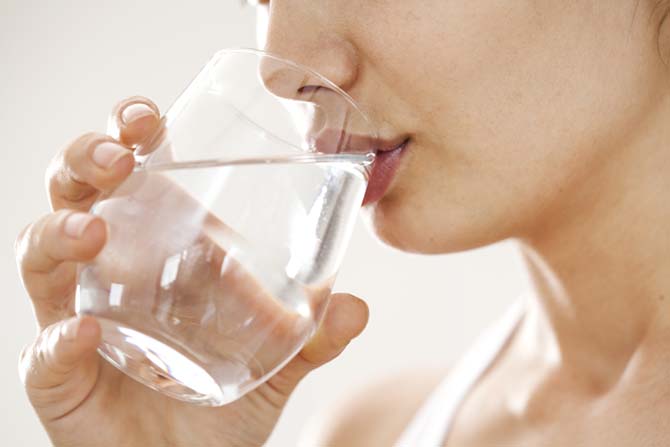
Adequate hydration heals your body and helps in the smooth and efficient functioning of cells. So it's no surprise that when it comes to post-nasal drip, there is nothing more helpful than water.
Water and other clear, unflavored liquids help you in getting rid of thick, pesky mucus by thinning it out and then secreting it from your body through the pores in your skin.
Other than water, you can also consume herbal tea (not green tea as it causes more dryness) and hot soups. Going old school isn't all that bad, sometimes. That is why your grandmother's warm and simple chicken soup can do the trick in clearing your nasal passage.
If you are actively involved in sports or an athlete, and you need to consume energy drinks, then try to dilute them in water first. If you are above 50 years old, you need even greater amounts of water to hydrate as older people are more prone to catching this condition due to dehydration.
Moreover, avoid drinking caffeinated beverages, as caffeine can encourage dryness and dehydration, especially in the nasal cavity.
Better Sleep Positions
To assure a peaceful night's sleep, try positioning yourself in an upright and elevated position. Sleeping on one side can accumulate the mucus to that side, which can further cause blockage of your sinus and aggravate the condition.
Similarly, do not sleep in a flat position and always keep an extra pillow under your head. Many people prefer keeping books under their heads as they keep them in an upright position.
Salt Water Gargles

Gargling is one of the best ways to soothe the throat as well as thinning the mucus. Always gargle with lukewarm water with salt in it.
You can add a teaspoonful salt to a couple cups of warm water and gargle for 2-3 days and you will see a difference in the thickness and even amounts of post nasal drip.
Steam
Inhalation of steam infused with essential oils such as eucalyptus helps to thin the mucus and relieve congestion and have been used for centuries to treat sore throat and congestion in the airways.
- Take a bowl of hot boiling water,
- Add a couple drops of essential oil,
- Drape a towel over your head and inhale the steam for 5-10 minutes,
- Repeat once or twice a day,
- Just be extra careful of the hot water
Foods To Avoid
When suffering from post-nasal drip, sore throat, and/or an itchy, runny nose, try your best to avoid reflux-aggravating foods. These foods include any kind of fried food, like fried fish, French fries.
You should ideally also avoid foods and beverages that are high in fat and/or sodium, like coffee, chocolate, citrus fruits, peppermint, sodas, and carbonated drinks. Too much intake of salt is also harmful as it absorbs excess water from the body and increases sodium levels in the body thus causes dryness.
Some safe foods to consider consuming instead are lean meats, brown rice, oatmeal, tummy soothers, ginger tea, and cucumbers. For a complete dietary guide to combating and preventing an aggravated state of post-nasal drip, read on.
Say NO to Dairy Products
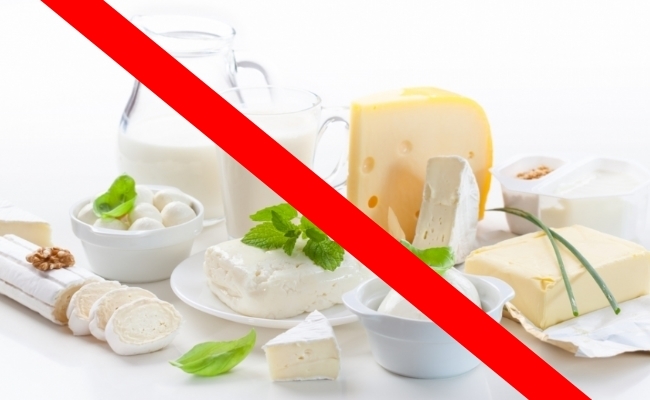
If you or anyone in your home is suffering from post-nasal drip, you may want to consider ridding your household of dairy products. Earlier, we talked about the importance of hydration and drinking liquids. Milk, unfortunately, is not one of these liquids.
In fact, dairy products like milk, cheese, butter, and yogurt are responsible for increasing mucus levels in your body and will certainly make a tough situation tougher.
Dairy products are one of the primary causes of sinus blockage and congestion. Avoidance of any dairy products will help a quick recovery.
Avoid Fried and Salty Foods
Fried food disturbs the sinus and thickens the mucus. It triggers the symptoms of post-nasal drip and may prolong it further in certain cases.
Moreover, foods with a salty disposition also dry out the nasal passages and further aggravate post-nasal drip.
Cut Out Refined Foods and Sugars
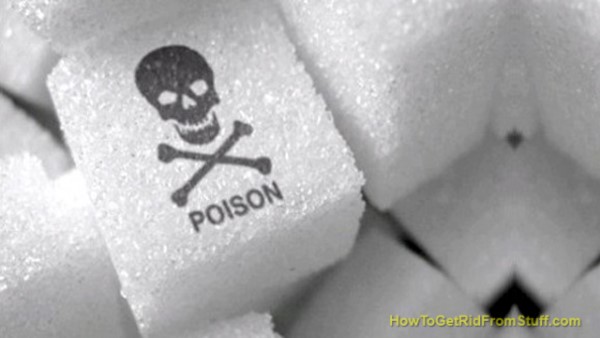
Refined sugars and processed foods such as white flour, chocolate, and white bread are also bad for your throat, especially when you are suffering through a post-nasal drip.
Your best bet is to keep your food simple and consume lots of unprocessed foods like wholegrain breads, fruits, and vegetables.
Foods To Consume
Now that we have highlighted some foods to avoid, here are the recommended foods to prevent and alleviate symptoms of post-nasal drip;
Non-Alcoholic Beverages
During the post-nasal drip, you may find it annoying to consume water and other liquids as your throat aches when you try to gulp them down. You may want to sip warm tea or coffee in the effort of soothing your throat, but remember that caffeinated beverages will only exacerbate your condition.
Drinking the right fluids will not only soothe your throat but also cause the thinning of the mucus, eventually clearing the nasal passage. Hydration is the best remedy when it comes to post-nasal drip and most of us aren't aware of this fact.
Alcoholic beverages are to be avoided like the plague. These drinks can further worsen your condition and aggravate the condition to a point where you will find seeking medical treatment a necessity.
While fighting the symptoms of post-nasal drip, all you need to do is to drink plenty of water (even cold water), lots of fresh juices and keep yourself hydrated.
Broth / Brothy Soup

Mild soup can be comforting for your throat. It soothes irritation and also thins mucus, giving you energy when you are feeling exhausted and lethargic. You can prepare a variety of homemade soups by including ingredients like ginger in it. Ginger has calming properties and it also helps in alleviating the conditions of post-nasal drip.
However, make sure that you don't use too much pepper, salt or sauces in your soup, as spices can increase the production of mucus. Moreover, stay away from creamy soups as dairy products are the main culprits of causing post-nasal drip.
Stick to mild, clear and non-chunky soups to treat your condition. You can also opt for chicken noodle soup to get some extra energy if you are facing difficulty in swallowing or unable to consume solids.
Cold Treats
Cold and soothing food and drink items are also efficient and effective ways to get rid of post-nasal drip.
This doesn't mean that you should start eating ice cream sandwiches or slushies. Instead, stick to natural products like fruit juice and fruity popsicles to treat your condition.
Once again, stay away from milkshakes or any treat which contains milk or lactose in it.
Cayenne Pepper
The antihistaminic properties of cayenne pepper can help relieve minor allergies and hence help in treating post nasal drip. The active ingredient of the cayenne called capsaicin, is known to thin the mucus as well. You can use cyan pepper in cooking.
If you can handle the heat of the pepper, you can try mixing about half a teaspoonful with a tablespoonful honey and eat it a couple times a day.
Vitamins and Minerals
Other than consuming the everyday foods and beverages, you should also include certain vitamins and minerals in your diet to speed up the process of recovery and complete your nutritional needs.
There are many cough drops and hard candies available out there which increase the production of saliva and clear out your mucus. These vitamins keep your throat moist and help in getting rid of post-nasal drip.
Consuming certain vitamins can also make you feel better, as they prevent the immediate symptoms of post-nasal drip from getting worse. The best vitamins for post-nasal drip are Vitamins A and C, Iron, and Zinc.
Pineapple
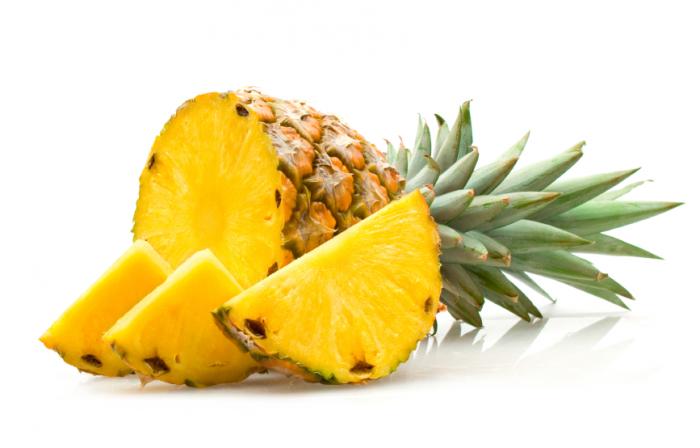
Fruits and vegetables, as mentioned earlier, are loaded with plenty of nutrients and vitamins that actively combat symptoms of post-nasal drip.
One of the fruits that can help clear the nasal passage is pineapple. Pineapple contains a proteolytic enzyme also known as bromelain. This enzyme is responsible for breaking down traces of protein present in mucus. In the process of doing so, it thins out the mucus and clears the nasal cavity thus helps you get rid of this condition.
Pineapple also contains anti-inflammatory capabilities which are beneficial for reducing swelling and thus makes draining and breathing easier (source)
Citrus Fruits
Citrus fruits are also an excellent reliever of post-nasal drip. These fruits are loaded with Vitamin C, which can lessen the effects of nasal blockage. Vitamin C fights off cold and flu as well.
Fruits that fall under this category include lemons, oranges, limes, and grapefruit. Grapefruit is especially beneficial in reducing the level of sodium content from your body. Grapefruit also contains anti-inflammatory properties.
To make consumption easier, it is best to squeeze out the juices from these fruits and drink them right away. (source)
Apple Cider Vinegar
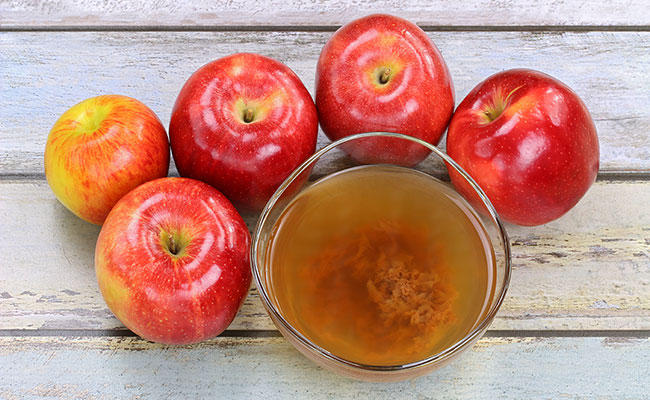
Apple cider vinegar is known to thin mucus and boost immunity as well. You can take a couple of teaspoonful of cider and mix it with some honey in warm water and drink the potion twice a day.
Another way of using apple cider vinegar is using it in your steam therapy discussed earlier.
Vegetables
The right vegetables are also a powerful way of getting rid of post-nasal drip. Vegetables are excellent defenders for your body and help clear out mucus.
Vegetables also contain high amounts of vitamins, minerals, and nutrients to fight with any illness. The best vegetables to consume are onions, celery, cauliflower, garlic, and asparagus. All of these vegetables contain healing properties, and could potentially lessen irritation in your throat.
See: Benefits of Using Garlic
To get rid of post-nasal drip, you can mix these vegetables in a brothy soup to boost the nutrients in your body, helping attack illnesses at the core.
Spinach, kale, broccoli, and parsley are also excellent sources of antioxidants as they are rich in chlorophyll. Antioxidants improve your immunity, and by consuming these vegetables daily, your body can defend against the symptoms of post-nasal drip. (source)
Lime
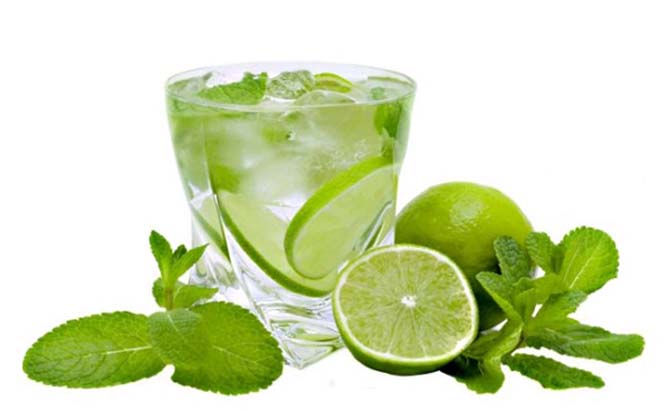
Green lime juice is known to decrease mucus production and work wonders to treat post nasal drip.
- Squeeze about half medium sized green lime in a cup of hot tea,
- Drink this concoction first thing in the morning,
- This will eliminate the mucus from last night in your system and also help clear your liver,
- You will feel energetic throughout the day
Moreover, Lemon can also be your best friend when suffering from this condition, even if you have a sore throat. Vitamins are best known for fighting off infections and boosting the immune system
When Should You Visit A Doctor?
If your post-nasal drip extends for more than 15 days and doesn't get any better, this is an indication that you should see a medical expert. Another symptom that reflects that you should visit a doctor is if the color of your mucus becomes bright yellow or green, or if you see traces of blood in it.
Your doctor will most probably prescribe you an antibiotic to fight with the condition. The main role of this antibiotic is to fight off the bacteria which is responsible for this condition.
Although post-nasal drip isn't a severe condition and it isn't a direct threat to your life, it can affect the quality of your life and can greatly hinder your daily activities. Therefore, it is necessary to stop post-nasal drip before it gets intolerable.
Additionally, you should also consider visiting a doctor when:
- Your mucus starts producing odor,
- You experience strong fever with body pain,
- You start hearing wheezing, especially when sleeping.
Do You Require Surgery?
There is another form of post-nasal drip known as a deviated septum. That is the condition when your post-nasal drip requires surgery, also known as septoplasty. Deviated septum tightens your nasal cavity and narrows it down, essentially constricting the mucus and trapping it in place.
With a deviated septum, it becomes necessary to undergo a surgery. Via this surgery, some parts of your nasal septum may require removal. (source)
Types of surgery include sinus surgery, turbinate reduction, and submucosal resection.
Medical Treatments and Prescriptions
In most of the cases, a commonly prescribed medications are a combination of steroids and Atrovent. Atrovent is commonly known as ipratropium bromide.
If your condition is due to fungal infection, you are very likely to be prescribed an antibiotic. Similarly, pollen allergies are generally treated by anti-allergy pills and humidifiers.
Other treatments, often in extreme cases, are treated through surgery, as discussed above.
Do not forget to consult your doctor before using any medication.
Best Medications for Post Nasal Drip
Best Powder For Post-nasal Drip
One of the best natural products for post-nasal drip is a powder medication is by "Islands Earth". It is one of the best treatments for reducing excess mucus buildup in the throat.
This powder also removes excess fluid from the lungs, and contains anti-inflammatory properties to fight off infections. The medication contains an all-natural formula, made purely from herbs and plant extracts, and doesn't have any hidden side effects.
Although this medication comes in powder form, you can also get it in the form of capsules. It is an excellent herbal treatment that soothes your throat and relaxes your chest by thinning out the problem causing buildup, and encourages healthy lung functionality.
As with any and all pharmaceutical medication, it is advisable to consult your doctor before using this medication, especially if you are already taking any other prescribed drugs.
Best Capsules For Post-nasal Drip
Another great medication for post-nasal drip is by "Breath" which is a well-known manufacturer of sinus and lung medications. This medication opens up your airways and clears the nasal passage.
It comes in the form of soft vegetable capsules that work immediately and let you enjoy a peaceful night's sleep.
The medication is excellent if you are suffering from chronic post-nasal drip, and will help you get rid of those stubborn sinus and cough problems.
Best Supplement For Post-nasal Drip
If you want to avoid taking strong medications, and are more into supplements and herbals treatments, then you should try the sinus relief supplement by "LES Labs".
This supplement is especially suitable for long term sinus health. It claims to cleanse your nasal cavity and restore moisture back to normal levels.
It is a natural formula which is free from steroids and drugs. It is loaded with the soothing properties of Nettle root, bromelain, and extracts from various plants such as butterbur. By regulating your histamine levels, it improves your respiratory health.
Best Irrigation System For Post-nasal Drip
Other than medications, many 'irrigation systems' are available to alleviate the symptoms of post-nasal drip. The irrigation system comes in the form of a machine where a solution of saline powder, sodium bicarbonate, calcium chloride, potassium chloride, and sodium chloride are present.
It produces steam consisting of all of these ingredients which goes deep down into your nasal passages and clears out mucus build up.
Irrigation tanks also come with a filter so that your nasal passage gets clean air: free of dirt and dust.
Check out this device, as it is FDA approved and it also comes with a 2-year warranty.
Tips To Prevent Sinus Infections
Apart from avoiding foods that causes sinus, following are some of the practical ways to cleanse your nasal passage and fight the underlying causes of post-nasal drip;
- If you are using any irrigation devices, keep them clean,
- Never use regular water for irrigation devices. Your water should be distilled. If you can't access distilled water then you can simply boil it,
- Always add some salt when inhaling steam. You can also add some baking soda, as this combination is helpful for fighting post-nasal drip and promoting healthy sinus activity,
- Visit your physician occasionally to wash out your sinuses under per-sterilized conditions,
- If you are allergic to pollen then don't forget to put on a face mask every time you go out during the spring and early summer seasons. It is always helpful to keep an anti-allergic medication with you at all times,
- Use decongestants in advance when the initial signs of post-nasal drip start appearing. The best decongestants to use are oxymetazoline and phenylephrine,
- During spring and early summer, try to consume as much water as you can to prevent the symptoms appearing ahead of time,
- Use humidifiers every night before sleeping during these months,
- Stop using dairy products altogether if you are prone to developing post-nasal drip.
Frequently Asked Questions
Here are some of the most commonly asked questions regarding this condition.
Can Post-nasal Drip Cause Phlegm?
Yes. Post-nasal drip involves the accumulation of mucus at the back of your throat. Due to the excess dripping of mucus, phlegm is also produced.
This is partially why people with this condition generally need to clear their throat frequently to eliminate phlegm.
Can Post-nasal Drip Cause A Sore Throat?
Yes, one of the common results of this condition is a sore throat, since exposure to dry air can cause increased production of mucus in the nose and throat.
This mucus keeps on building up and thickening over time and you may experience a feeling of mucus dripping at the back of your throat. This also leads to a sore throat, complications in swallowing, and coughing.
Can Post-nasal Drip Cause Diarrhea?
Not really. Post-nasal drip doesn't directly cause side effects like diarrhea, but mucus can show up in your stool. This is because when the body starts producing excess mucus, the intestinal tract also produces a layer of mucus to protect the body from external elements.
Thus, this mucus breaks down in the form of a cloud and starts excreting out along with stool. As a result, you may start noticing cloudy and foamy stools.
In short, post-nasal drip doesn't directly result in diarrhea.
Can Post-Nasal Drip Cause Heartburn?
Yes. One of the major consequences of post-nasal drip is heartburn or Gastroesophageal reflux disease. It is acid reflux where acid from your stomach reverts into the esophagus.
This condition is most commonly experienced at night because gravity allows the acid to surface to the top of your esophagus.
Is Post-nasal Drip A Sign Of Cancer?
Sinus and nasal cancers are closely related to each other. However, having this condition doesn't necessarily mean that you have cancer.
It only occurs in case of prolonged post-nasal drip and nasal congestion which doesn't go away with home remedies and even with medication.
Moreover, post-nasal drip may signify cancer only when the nose is congested on one side. Headaches, intense nasal pain, pain around the eyes and inside your cheek as well as in the eyes and ears is when the condition may have aggravated towards a cancerous growth.
In certain situations, you may also feel numbness in your teeth or on the entire face. Please consult a doctor immediately if you experience any of these additional symptoms.
What Should You Take For A Post-nasal Drip?
It is best to take fluids and lots of water for post-nasal drip. See 'foods to consume'. Fruits and vegetables are also rich in vitamins and minerals and are excellent sources of a cure for this condition.
Moreover, a healthy diet rich in antioxidants is also strongly advised.
How Should You Sleep When Experiencing Post-nasal Drip?
While suffering from post-nasal drip, you may want to cleanse and clear your airways constantly by eliminating the phlegm which accumulates in your throat.
Phlegm is why your nights can become a lot more difficult, as it can further allow easy dripping of mucus in the throat and cause blockages.
A greater amount of mucus can make your throat even more sore and scratchy. Sleep upright, in an elevated position, to prevent mucus from accumulating in your respiratory tract.
What Should You Avoid While Suffering From Post-Nasal Drip?
You should avoid dairy products like milk, cheese, yogurt, and all other products which contain milk. You should also stay away from spicy food, fried food and anything that contains high volumes of sodium. See 'foods to avoid' for more detail.
Furthermore, drinks like alcohol and soda should also be avoided when suffering through this condition.
Which Foods To Consume For Post-nasal Drip?
Citrus fruits, leafy green vegetables and lots of fluid are good to alleviate this condition.
Pineapples are also a great source of relief for post-nasal drip, along with foods rich in minerals and vitamins. See 'foods to take'.
What Is The Most Common Cause of Post-Nasal Drip?
There is no single cause that leads to a post-nasal drip. There are plenty of causes, depending on body type and ambient conditions.
Allergies from plants and animals, viral and fungal infections, bacteria attacks and dryness in the air, all factor into the root causes of post-nasal drip.
Certain medications also trigger this condition. The use of the saline spray in more than required amounts also leads to this condition.
Verdict
The best way to stop post-nasal drip is to prevent allergy-causing factors as much as possible.
Most of the time, post-nasal drip is curable with home remedies. However, in elderly people, the condition becomes much worse and could indicate the need for surgery.
Always follow precautionary measures and keep yourself safe by avoiding certain food and drinks.
Key Takeaways
- Take an anti allergic medication during your post-nasal drip. Many allergy vaccines are commonly used for this purpose,
- Keep your surroundings free of dust as much as possible and avoid exposure to such conditions, if at all possible,
- Replace your pillows cases and bedsheets frequently to protect yourself from dust mites,
- Clean and service any air conditioners in your household regularly. Ventilators and heaters also need to be maintained regularly to ensure protection from dust,
- Avoid the use of dehumidifiers in the home as they dry out the air. Also try to avoid being in the proximity of air conditioners using inverter technologies,
- If you have a seasonal allergy, don't forget to take a shower before bed, especially after spending time outside.
That's all you need to know about your sinus health and how to keep your nose and throat free of excess mucus.
If you have more questions and know any other home remedy to get rid of post nasal drip, please let us know in the comment section below.
We wish you great sinus health!
How to Get Rid of Mucus and Post Nasal Drip
Source: https://howtogetridfromstuff.com/health/how-to-get-rid-of-post-nasal-drip/